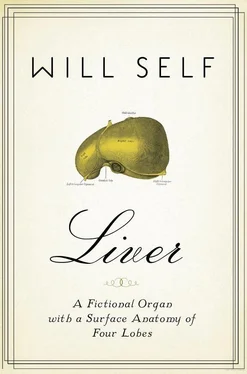‘He discharged himself from the London Clinic yesterday, did he tell you?’
Athene, who has introduced herself only as ‘a friend’, blanches.
‘He was meant to have a liver shunt put in today, but it’s too late for that now. There’s massive distension here — his tummy is full of blood.’
Doc Ben is a good enough doctor, just, to notice this; although not good enough to spot the long, curved feather that’s wedged between patient and mattress. ‘I’m gonna call for an ambulance — he needs to be in an intensive-care unit as soon as possible. Do you know who his next of kin are, Ms. ’
‘Athene,’ she concedes, then asks, ‘Is he going to die?’
‘Die? I dunno about that.’ He could be speculating on poor ticket sales for a Deep Purple reunion gig, so mundane is his tone. ‘I can tell you this: if he can be stabilized — and that’s a fairly big if — he’ll need a liver transplant, deffo. His liver’s. ’ He pauses, regarding her well-used voluptuousness at the same time as he, belatedly, registers her name; then allows himself a definitive ‘fucked’.
The griffon vulture watches from the summit of the north-west chimney of Battersea Power Station as Prometheus is stretchered from Chelsea Bridge Wharf to the waiting ambulance. She’s driven away the peregrine falcons — London’s sole pair — whose nesting site is this modernist ruin: a redbrick cliff-face, saturated with sulphuric acid and carbon, the best monument possible to humankind’s transmogrification of the earth.
From her lofty vantage, the vulture stares down on traffic, river, park greenery and the mop-top of Athene, who skips to the far side of the road, intent on hailing a cab to get her away from this awful wharf.
*
A fortnight later Epimetheus met up with Neil Bolton for a drink at the Sealink Club. Epimetheus didn’t bother much with the Sealink any more; the ad industry’s social interaction, such as it was, had headed east, to where the new generation of mono-nominal agencies — Mother, Naked, Poke, Dare and Titan itself — had gone to ground amidst the artists’ studios and Bangladeshi sweat shops of Whitechapel and Shoreditch.
As for Bolton, he’d never been an habitué of the Sealink, which, despite having suffered new owners and revamped decor at least twice in the past decade, still had a car-ferry ambience, what with its safety lights caught in wire basketry, three-legged triangular chairs and raised door sills. The gents’ urinal was a waterfall in a zinc trench, the stalls a storm in a space shuttle. This, the quintessence of chic circa 1980, was all far too modish for Bolton, who longed to strip the skirts from the yattering women who frequented the club, if only to put them on the table legs.
Bolton, who in recent years had become the narrator of a fiendishly successful TV sketch show — think both spin-off dolls and hagiographies of its originators in the qualities; think of catchphrases as widespread and involuntary as sneezes — now gave himself airs that would’ve been insufferable coming from Kean. When Epimetheus came in, Bolton was standing centre bar, his big fleshy face hanging in the air like a bruise, poorly bandaged with several loops of a long woollen scarf. He was holding forth to the barman, and his basso voice, like Pavlov’s tinkling bell, recalled insistently to the minds of all who were hearing it the mineral water, meat, detergent and, latterly, energy drink it had been used to advertise, as it rumbled through the bar, inexorable as waves crashing on a shingle beach.
Spotting Epimetheus, Bolton boomed, ‘My dear boy, how’s Prometheus?’
‘He’s fine, really Neil.’ Epimetheus ordered a gin and tonic.
‘That’s not what I hear,’ Bolton told everyone. ‘I’ve heard he’s in and out of hospital every few days — some sort of liver thing.’
Liver thing. Bolton managed to deliver the words with coloratura at once bloody and bilious. Liver things — Bolton knew all about these: his last decade or so had been a cellular go-round, from bar, to recording studio, to rehab, and back again.
‘Shush, Neil.’ Epimetheus went so far as to take the old thespian by his boneless arm and give it a squeeze. ‘Please, I don’t want any more talk.’
This was a futile admonition, given that Bolton was nothing but talk; besides, the cutting-edge creatives may no longer have supped at the Sealink, but their older, blunter colleagues were all there: client directors, chief strategy officers and group accountants from Abbott Mead Vickers, Bartle Bogle Hegarty, and Saatchi and Saatchi, who, while they may have lost the ability to create particular standout, still retained good noses for the bouquet of distress and the stench of failure.
‘He’s absolutely fine,’ Epimetheus continued, signalling to the barman to get them both another drink. ‘As it happens, we’ve gotta big pitch tomorrow, Hermes.’
‘Scarves?’ Bolton said, tugging on his own.
‘No, the other lot — mobile phones.’
This wasn’t a work drink. At this point in his liverish life cycle Bolton was useless to Titan; he was so bloated with fine wines and TV residuals that he’d completely forgotten the voice-over he’d done for Zeus mineral water only ten days previously, and instead blethered on about his finest theatrical performances. His Falstaff (Southampton Gala), his Henry Higgins (Stamford Arts Centre) and, of course, his triumphant Hamm at the Peacock.
Epimetheus, whose knowledge of Beckett’s plays was sketchy, kept hearing Endgame as ‘end-line’, which dragged him back to advertising, and his own naive faith in luxury goods, graven images and idols with everything of clay. Which dragged him back to. Pandora, who had brought oodles of vice and insanity into his life.
The previous evening he had arrived back from Old Street to find her fucking a stranger in his own bed. Epimetheus drubbed the man from the place; his last sight of him was a bare bottom impressed with the tread of his boot. He threw the man’s clothing out the window, then had to endure Pandora’s full-fledged psychotic breakdown: handwashing without soap or water; a ‘Pakki’ called Andy beating her, who likewise wasn’t there; then the spewing of five dirty tongues with her delicious little one. And then — shameful this — he ravished her, after which they did drugs together.
In the ten days since she had moved into his loft, Pandora had begun to abstract Epimetheus’s goods. They were bizarre thefts — a single cuff link one day, a solo stereo speaker the next. The smooth materiality of his existence was being peppered with holes — yet still he cleaved to her; they would, he avowedly hoped, be together in old age, snuggling down into the soft ruin of their bodies.
Hence this get-together with Bolton, for advice on where Epimetheus could send his love so that she could ‘get better’. Who better than Bolton, who’d done ’em all? Primary treatments, secondary ones; halfway houses, three-quarter ones; then first-through-third-stage sojourns. Bolton, slobbing out in front of wonky tellies watching fake dramas, while the real tragedy of his life was right to hand — at his feet, where poorly laid carpet tiles curled up from the carpet tiles that had been poorly laid by the last batch of recovering alcoholics.
Ach! Bolton! So washed away by the longshore drift of his alcoholism that he could no longer tell which group he was not a part of. Were these stacking chairs circled for talking or drinking therapy? How should he pitch this old tale of derring-tipsy-do, as pathos, bathos or self-flagellating realism? In his old haunt, the Plantation Club, Bolton was nothing but a joke — and a bad one. To abandon his drinking comrades once was a betrayal; to do it again and again was their equivalent of a war crime. Hilary, the Plantation’s commanding officer, had stripped Bolton of his old moniker and given him a new one; he was no longer ‘the Extra’ but only ‘the Prop’; because, despite having been barred, he still insisted on coming back and propping himself against it. The bar, that is.
Читать дальше












